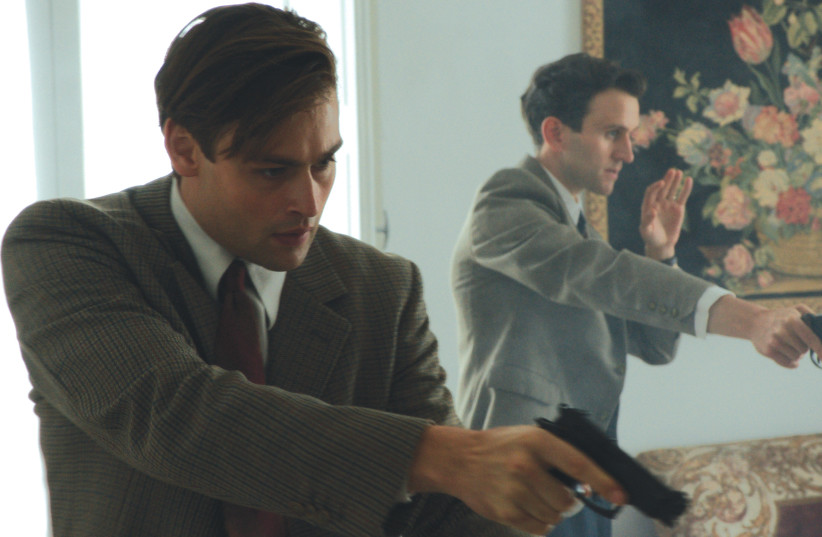Michael Winterbottom’s latest film, Shoshana, dramatizes a real love story that took place in Palestine during the British Mandate period that few Israelis remember today. Anyone who can fully grasp the meaning of all the movie’s twists and turns will be well on their way to understanding everything that is going on in Israel today.
While Shoshana ends nearly 80 years ago, the ghosts of that period still haunt us today and the movie weaves a fascinating tapestry of life in Tel Aviv in the late-1930s to the mid-1940s, with its passions, intellectualism, factions, and bloodshed. But at times, though, in its quest to stay faithful to the complexity of the facts it presents, Shoshana loses focus as the historical narrative interferes with the intensity of the romance.
The movie uses a newsreel format to give the story historical context and to lay out the many different factions who fought each other during the pre-state years. No matter how much time you have spent in Israel, you may find yourself turning to Wikipedia after the movie ends.

While Shoshana has no doubts about where she stands and her commitment to the cause, she is having a love affair with Tom Wilkin (Douglas Booth), a British police officer stationed in Tel Aviv. The two enjoy the cosmopolitan atmosphere of the city together, especially the nightlife, and they often dance most of the night away and spend the rest of it at his apartment.
Tom has come to see Palestine through her eyes and is so drawn to the city, that he even entertains the idea of staying on once the British leave, as many at the time already assumed that they would.
But then Gregory Morton (Harry Melling), a much more hardline British officer is sent from Jenin, where he has been quelling anti-British riots by the Arabs, to find and root out Jewish extremists in Tel Aviv. He is suspicious of Shoshana and Tom’s relationship and worries that Tom is not tough enough.
Morton recruits informers and as much as Shoshana and Tom try to preserve their idyllic relationship, the world intrudes, tearing them apart from each other.
THE SHARPLY observed portraits of Morton and Stern are so well done that the eponymous heroine and her lover get lost in the convoluted plot. Starshenbaum, who was excellent in the Russian movie Leto, about the ’80s rock scene, is convincing as a tough-minded woman who longs for a world where she can love a British man without it causing a huge conflict.
Booth is similarly passionate and the two have chemistry in their love scenes, but somehow the impact of their story, which should be the film’s anchor, dissipates as the movie goes on.
Alby, making his movie debut, is so compelling as the preternaturally confident poet Stern, who nevertheless organized and carried out violent attacks to try to achieve a state, that it seems that he should have his own movie, and I’m sure he will have a starring role soon.
Melling has been so good in so many movies and television series, such as the Coen brothers’ The Ballad of Buster Scruggs (where he played the amputee who is carried around the West reciting Shakespeare and poetry) and The Queen’s Gambit, but here he seems rather bland. Although he is playing Tom’s adversary, you might expect him to come off as the heavy of the piece.
<br><br>Does 'Shoshana' lack drama?
But there is no real heavy here. Shoshana brings to mind the famous quote from Jean Renoir’s Rules of the Game, “You see, in this world, there is one awful thing, and that is that everyone has his reasons.”
Winterbottom is skilled at getting us to see everyone’s reasons, and although that is a fair and interesting way to tell the story, it is not necessarily the most dramatic way. There is a reason that Israeli directors, who presumably grew up on these stories, have avoided this period since Avi Nesher made Rage and Glory, about a cell of Stern Group fighters, in 1984.
Nesher was vilified by both the Right – who felt that his presentation of Jewish terrorism could be used to justify Palestinian terrorism – and the Left, who claimed that he glorified and justified the Jewish extremists. The movie was denounced in the Knesset and no major movie has been made about this period since. There is no way to tell the story without involving all the factions, but that brings us back to the Renoir quote.
Winterbottom, one of Britain’s most acclaimed filmmakers, has made a number of movies about conflicts, such as The Road to Guantanamo, and A Mighty Heart, about the kidnapping and assassination of Jewish-American reporter Daniel Pearl. He knows how to tell complex stories.
He has focused on the Jews and the British here, and Arabs are seen mostly in a scene where they are threatened with execution to get them to reveal who is hiding weapons. He seems to know his characters inside and out, especially the British, who are fed up with just about everyone. When a Jew is killed making a bomb in his apartment, a British police officer dismisses the incident, saying, “There’s one less of them now.”
But somehow, the wide canvas here doesn’t present a satisfying picture, despite the echoes of the conflict that continue till today. I almost wished this were a mini-series rather than a movie, so each character could be developed further. Tel Aviv of this era was so complex, that it defeats this attempt to tell its story in two hours.
